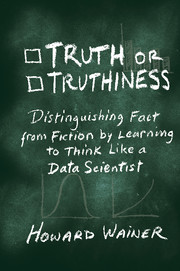Book contents
- Frontmatter
- Dedication
- Contents
- Preface and Acknowledgments
- Introduction
- Section I Thinking Like a Data Scientist
- 1 How the Rule of 72 Can Provide Guidance to Advance Your Wealth, Your Career, and Your Gas Mileage
- 2 Piano Virtuosos and the Four-Minute Mile
- 3 Happiness and Causal Inference
- 4 Causal Inference and Death
- 5 Using Experiments to Answer Four Vexing Questions
- 6 Causal Inferences from Observational Studies: Fracking, Injection Wells, Earthquakes, and Oklahoma
- 7 Life Follows Art: Gaming the Missing Data Algorithm
- Section II Communicating Like a Data Scientist
- Section III Applying the Tools of Data Science to Education
- Section IV Conclusion: Don't Try Th is at Home
- Bibliography
- Sources
- Index
1 - How the Rule of 72 Can Provide Guidance to Advance Your Wealth, Your Career, and Your Gas Mileage
from Section I - Thinking Like a Data Scientist
Published online by Cambridge University Press: 05 December 2015
- Frontmatter
- Dedication
- Contents
- Preface and Acknowledgments
- Introduction
- Section I Thinking Like a Data Scientist
- 1 How the Rule of 72 Can Provide Guidance to Advance Your Wealth, Your Career, and Your Gas Mileage
- 2 Piano Virtuosos and the Four-Minute Mile
- 3 Happiness and Causal Inference
- 4 Causal Inference and Death
- 5 Using Experiments to Answer Four Vexing Questions
- 6 Causal Inferences from Observational Studies: Fracking, Injection Wells, Earthquakes, and Oklahoma
- 7 Life Follows Art: Gaming the Missing Data Algorithm
- Section II Communicating Like a Data Scientist
- Section III Applying the Tools of Data Science to Education
- Section IV Conclusion: Don't Try Th is at Home
- Bibliography
- Sources
- Index
Summary
The sciences do not try to explain, they hardly even try to interpret, they mainly make models. By a model is meant a mathematical construct which, with the addition of certain verbal interpretations, describes observed phenomena. The justification of such a mathematical construct is solely and precisely that it is expected to work.
John Von NeumannGreat news! You have won a lottery and you can choose between one of two prizes. You can opt for either:
$10,000 every day for a month, or
One penny on the first day of the month, two on the second, four on the third, and continued doubling every day thereafter for the entire month.
Which option would you prefer?
Some back-of-the envelope calculations show that after ten days option (1) has already yielded $100,000, whereas option (2) only yielded $10.23. The choice seems clear, but we continue with some more arithmetic and after twenty days (1) has ballooned up to $200,000, and option (2) has yielded $10,485.75. Is there any way that over the remainder of the month the tortoise of option (2) can possibly overtake the hare of option (1)?
Quietly, however, even after twenty days the exponential momentum has become inexorable, for by day twenty-one it is $21,971, by day twenty-two it is $41,943, and so by day twenty-five, even though option (1) has reached its laudable, but linear, total of $250,000, option (2) has passed it, reaching $335,544 and is sprinting away toward the end-of-the-month finish line.
If the month was a non–leap year February, option (2) would yield $2,684,354, almost ten times option (1)'s total. But with the single extra day of a leap year it would double to $5,368,709. And, if you were fortunate enough to have the month chosen being one lasting thirty-one days, the penny-a-day doubling would have accumulated to $21,474,836.47; almost seventy times the penurious $10,000/day's total.
As we can now see, the decision of which option to choose is not even close. Yet, even though the choice of option (2) was a slam dunk, how many of us could have foreseen it?
- Type
- Chapter
- Information
- Truth or TruthinessDistinguishing Fact from Fiction by Learning to Think Like a Data Scientist, pp. 14 - 18Publisher: Cambridge University PressPrint publication year: 2015



